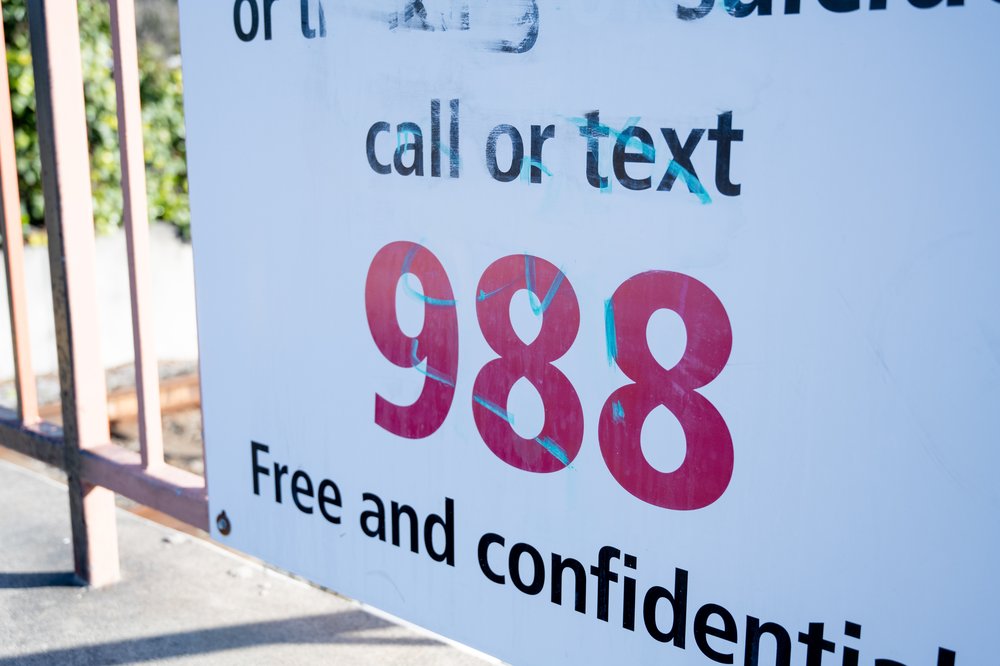Operator of NYC’s mental health crisis hotline warns of layoffs without more funding
April 25, 2025, 6 a.m.
The nonprofit that operates the hotline says staffing reductions would limit its ability to help people in crisis.

The nonprofit that operates New York City’s 988 crisis and suicide hotline said it will have to lay off up to a third of its roughly 300-person staff in the coming months due to a more than $10 million shortfall — unless the city steps in with funding.
“ Our concerns are [that] if we miss somebody's call, does that escalate?” said Brenda Tong, chief program officer at Vibrant Emotional Health, the nonprofit. “Does that turn into a 911 call? Does that turn into a hospitalization?”
The federal government in 2022 established 988 as the national number to call for a mental health crisis, but callers are routed to locally operated centers so they can be connected to counselors and services in their area. NYC 988 replaced NYC Well, a crisis service established under former Mayor Bill de Blasio that was also operated by Vibrant Emotional Health.
Tong said fewer staff will mean longer wait times for callers in crisis and more callers giving up before they reach a counselor. Her group’s warning comes as city leaders and mayoral candidates grapple with long waitlists for some mental health services and debate whether to rely more heavily on involuntary hospitalizations for psychiatric care.
Rachel Vick, a spokesperson for the city health department, said Vibrant’s annual funding was reduced by more than $10 million last year because its call volume was lower than anticipated. But Vibrant and the city differ in their tallies of how many calls, chats and texts the organization fields each year — and the nonprofit said those numbers were on the rise.
Divendra Jaffar, a spokesperson for Vibrant, said the city has also underestimated how much work goes into making technological upgrades and dispatching the city’s mobile crisis teams, which do in-person mental health check-ins.
"988 is a valuable resource for communities across the city as we continue our efforts to support the mental health needs of New Yorkers," Vick said in a statement. She did not respond to Vibrant’s concerns about potential layoffs.
In its current three-year contract with the city, which started in July 2024, Vibrant receives about $22 million a year to operate 988, according to Jaffar. That’s down from the previous amount of about $33 million, which Jaffar said was much closer to the cost of running the service.
The City Council’s budget proposal for the coming fiscal year, which starts in July, includes a $10 million boost for the local 988 operator. But Vick said Vibrant accepted the contract with the current funding levels. Councilmembers are still negotiating the city’s next budget with Mayor Eric Adams’ administration.
NYC’s 988 service is funded through a mix of federal, state and city dollars. But Justin Mason, a spokesperson for the state Office of Mental Health, said the agency has only increased the amount of money it’s passed down to the city for 988 in recent years. Any reduction in the contract with Vibrant was at the city’s discretion, he added.
Tong started at Vibrant last August, and said previous leadership signed its 988 contract. She said she has since told city officials that the new budget is not viable adding that Vibrant was able to plug the funding gap and avoid layoffs until now by dipping into administrative funds.
“ We're near the tipping point where we just can't afford to keep floating these salaries,” she said, noting that layoffs would likely include those who answer 988 calls as well as supervisors.
According to the health department, Vibrant’s contract pays for up to 334,000 calls, texts and chats per year, which is about how many interactions the nonprofit received last fiscal year.
But Vibrant said it responded to 416,473 such messages that year, or about 25% more than the number specified in the contract. The organization has estimated the call volume will grow about 5%, to more than 436,500 interactions, in the current fiscal year, or about 100,000 more than the city has budgeted.
Jonathan Chung, director of policy and advocacy for the New York City chapter of the National Alliance on Mental Illness, said the city should not shortchange the hotline, which he described as a “lifesaving tool.”
“A lot of folks who have been in real crisis [have] called that number and have gotten help,” he said.
Still, Chung said he wished more people knew about 988 and said city officials should publicize it better. In a national survey conducted by the National Alliance on Mental Illness last year, about a third of respondents said they had never heard of the hotline, while another 27% said they had heard of it but were not familiar with what it did.
If you or someone you know is experiencing a mental health crisis, call 988 or visit NYC 988 online.
NYC Council press officials to cut wait times for mobile mental health teams NYC leaders divided over involuntary hospitalization of people with mental illness